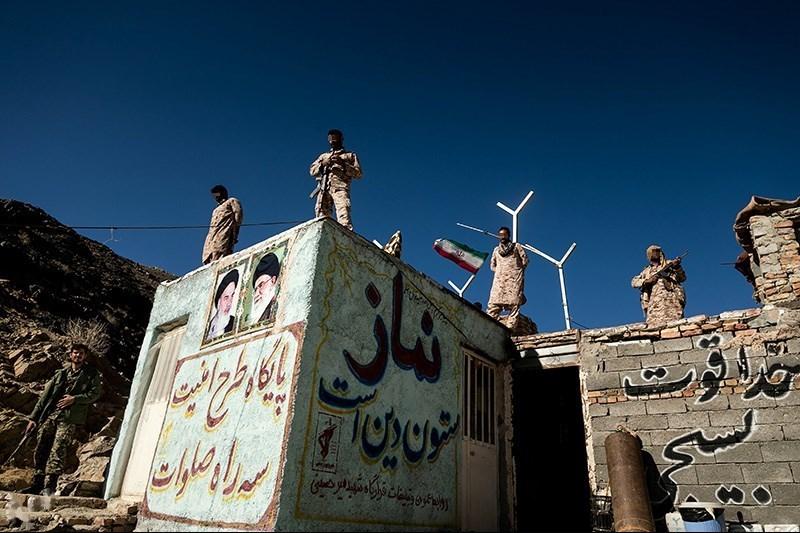 IRGC Ground Force Commandos | Hossein Zohrevand
IRGC Ground Force Commandos | Hossein Zohrevand
Iran’s Destabilizing Activities in the Middle East
President Biden has asserted his commitment to reengaging in negotiations on Iran’s nuclear program, stressing that the U.S. must also address Tehran’s destabilizing activities across the Middle East. Tehran has increasingly utilized non-state actors to expand its regional influence and achieve its strategic objectives in the Middle East. The Islamic Republic has provoked and exacerbated conflicts that have resulted in mass civilian casualties, displacement, and destruction of infrastructure.
As the worlds’ leading state sponsor of terrorism, Iran has supplied arms, personnel, training, and finances to various proxies throughout the region. Much of its operations are conducted through the Islamic Revolutionary Guard Corps (IRGC), a branch of the Iranian armed forces that has been designated a Foreign Terrorist Organization (FTO) by the U.S. since 2019. The IRGC has recruited and trained fighters and equipped them to assist Iran-backed militias in various proxy conflicts. Outlined below is an overview of Iran’s destabilizing activities in the Middle East.
Lebanese Hezbollah
Hezbollah is Tehran’s most instrumental non-state actor in the Middle East, and its missile arsenal and foreign operation capabilities are crucial to Iran’s destabilizing activities. The militant group is strongly aligned with Iran’s Supreme Leader, Ayatollah Ali Khamenei, and advocates for the establishment of an Islamist regime in Lebanon like that of Tehran. Iranian support has been crucial to Hezbollah’s expansion; Tehran is estimated to provide $700 million in funds annually and supplies most of the group’s military technology. Hezbollah has become involved with many of Iran’s proxy conflicts as well, providing personnel and training to militias in Yemen and Syria.
Influence in Iraq
Since the 2003 U.S. invasion, Tehran has focused much of its coercive power on countering the U.S. military presence in Iraq and shaping the development of the Iraqi state. Over the past two decades Tehran has exploited religious, geographical, and cultural ties to infiltrate the Iraqi government. Iran-backed militias like Kata’ib Hezbollah and Asa’ib Ahl al-Haq have become increasingly involved in military and political institutions, with many holding top government positions in the Iraqi parliament.
Iraq is one Iran’s largest trading partners and Tehran depends heavily on its economic relationship with Iraq to counter the crippling effects of international sanctions. Iran invests in a wide range of infrastructure projects for non-oil industry expansion, economic development, and religious tourism in order to sustain financial leverage in Iraq.
Iran has utilized the two countries’ shared Shi’a religious affiliation to coercively strengthen trust and cooperation. Shi’a religious foundations owned by the Islamic Revolutionary Guard Corps (IRGC) have undertaken multi-million dollar infrastructure projects throughout the country to expand religious tourism. These Shi’a holy places enhance Tehran’s ability to exert soft-power influence over the country.
Yemen’s Houthi Rebels
Tehran has aided Yemen’s Houthi rebel group since the Arab Spring uprising in 2012 to combat the Saudi-led coalition of Gulf States supporting Yemen’s internationally recognized government. Prolonging the conflict in Yemen is of relatively low-cost to Iran and serves as a perfect outlet for damaging Saudi Arabia. Tehran also seeks to establish a presence in the Bab el-Mandeb Strait, a strategic trade route for shipments of petroleum and natural gas.
Tehran has spent hundreds of millions of dollars on the Houthis, allowing them to progress from a fragmented rebel group to a lethal armed movement. The Houthis receive significant economic support, military assistance, personnel, and training from the Islamic Revolutionary Guard and Iran-backed Lebanese Hezbollah. Iranian weapons such as ballistic missiles and unmanned aerial vehicles (UAV) have been used in deadly attacks, sabotaging peace efforts and escalating the conflict in Yemen.
Assad Regime in Syria
The Iran-Syria alliance is rooted in a strategic alliance between authoritarian regimes, not religious affiliation. Syria serves as a crucial transportation route for Hezbollah’s armaments and allows for a consistent flow of weapons to the Iran-backed militant group. Investing in Syria’s security also counters U.S. and Russian involvement while amplifying the threat against Israel.
Iran has supported President Bashar al-Assad throughout the Syrian conflict to increase its military and security influence in the country. Tehran has supplied the Assad regime with nearly $5 billion in credit and over $10 billion in funding since the start of the war. The IRGC has worked with foreign militias and recruited local Shi’a militias to fight in the Syrian army, luring them with high paying salaries. Many private Syrian security companies are secretly affiliated with Iran and exert influence over strategic areas like the Baghdad-Damascus highway in Syria’s eastern desert.
Since 2017 Iran has decreased its military operations in Syria and focused on expanding influence in Syria’s economy and society. Tehran has created ties with Syrian businessmen and invested in a variety of projects focused on power generation and industry development. In order to gain loyalty from local populations in Syria, Iran has supported charitable organizations in the construction of educational facilities, cultural centers, and medical points.






